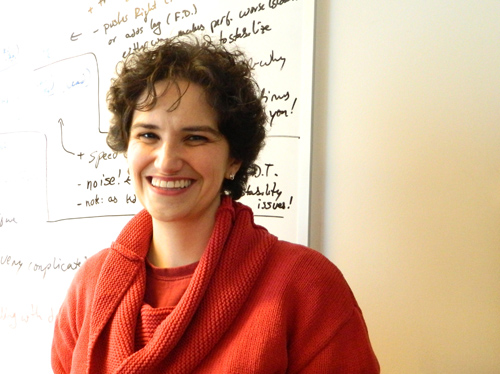
Imagine that you are trying to design an autopilot for an airplane. You want it to work with minimal intervention from the pilot, to maintain the altitude and directions that have been set, to make turns smoothly so that passengers are comfortable, and to prevent the airplane from falling out of the sky.
You come up with a design that works, but now there’s another thing to consider. What if something goes wrong – an engine fails or you hit turbulence, for example? Can your autopilot respond to unexpected changes and still fly the plane in a smooth, comfortable way?
“People are really good at handling these unexpected situations, but machines generally are not,” says engineering Prof. Julie Vale. Her goal is to make them better at it.
In theory, anyway. “My work is entirely theoretical,” she explains. “We’ve proven that this is doable mathematically, and that the theory works on a very large set of systems. Now what I’d like to do is actually build a system and be able to poke it and pull pieces off it and see if we can have it still work really, really well.”
Like many in the field, Vale, who was born in Mississauga, comes from a family of engineers. “I like building stuff and I like math,” she says, so following in their footsteps seemed sensible. She earned her undergraduate and graduate degrees at the University of Waterloo, then did a post-doc and some teaching there. Her thesis research topic was optimal performance in the face of system uncertainty – with possible applications being that theoretical autopilot described above.
Looking for other ways to satisfy her interest in systems and design, Vale’s currently working on getting a grant to do research on smart grids. “Right now, power companies are installing smart meters in people’s homes,” Vale explains. “Those meters gather data about electricity use. I want to look at ways we can use that data to make decisions from the supply end, decisions that could save money and protect the environment.”
For example, she says, on a very hot day, the system could (with your permission, of course) adjust your air conditioning to run a degree or two warmer during the day when nobody is home. This would save you money, but also reduce the load on the system and the risk of blackouts. “My other work was highly theoretical, while this work is very applied,” comments Vale.
She’s looking at smaller projects because her position is teaching-focused. “I always wanted to be a teacher – I’ve been teaching in one form or another since I was in high school when I started tutoring,” she says. She believes that learning through investigation is crucial for engineers. “I prefer to let students discover things for themselves: here’s a problem, solve it. Did that work? No? Let’s try something else.” Obviously, she adds, the problems have to be tailored to the level of the students and the professor must provide considerable support and guidance.
“There are some things you need to memorize, but I want my students to do more than just memorize. They not only have to know the tools in their toolbox, they have to know how to use them,” she says. She also tries to keep changing her approaches to make the work challenging and to keep her students engaged and interested.
“I’m very happy here, it’s a very warm environment,” she adds.
Vale’s busy at home as well, with a four-year-old daughter and a three-month-old baby girl to care for. “I’m really treading water with a new job and a new baby,” she says. “I hope one day to have time for hobbies again.” When that day comes, she plans to indulge her love for her two surprisingly different interests: Formula 1 racing and yoga.